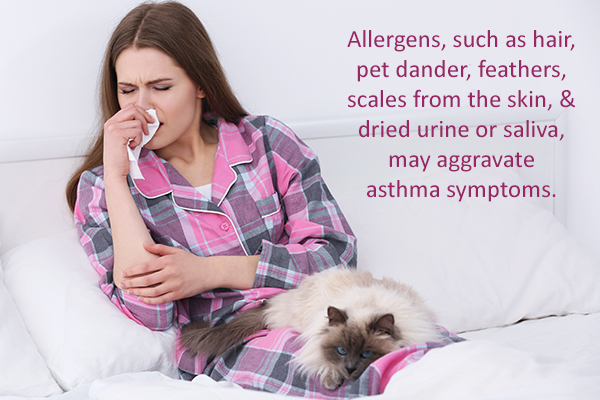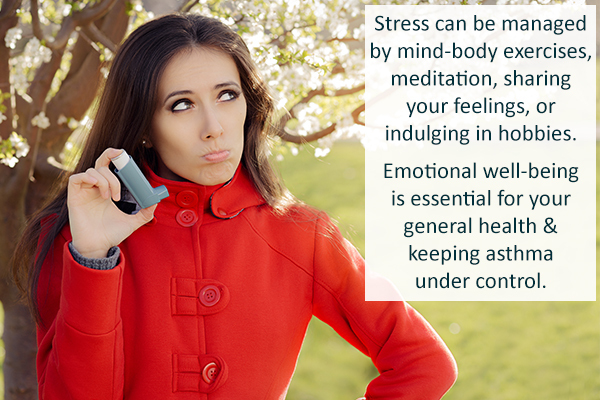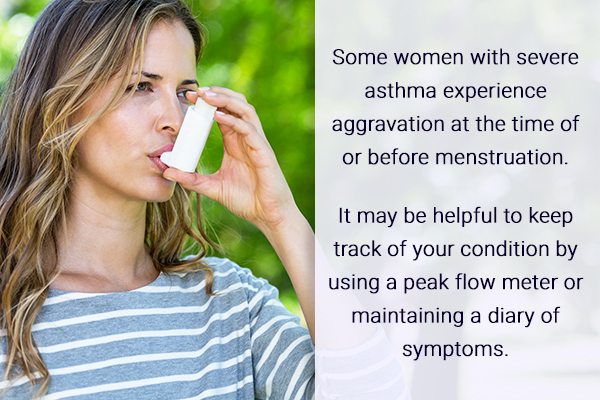In this article:
Asthma is a widespread respiratory tract disease that varies in severity from an infrequent, mild wheeze to an acute, fatal airway closure. It is highly prevalent among children and is associated with other atopic diseases, such as hay fever and eczema.

Asthma attacks and exacerbations contribute to increased hospital admissions and healthcare costs. The condition may be fatal if not dealt with urgently.
Home Remedies for Asthma
The following home remedies can be tried to relieve the symptoms of asthma.
1. Consume turmeric
Turmeric contains curcumin, which has anti-inflammatory properties. (1)(2) Taking turmeric capsules containing curcumin has been found beneficial in relieving asthma. However, more studies are needed to establish its role. (3)
How to use:
Add turmeric as a spice to your food or consume warm turmeric milk or tea. Take supplements only upon consulting your doctor.
Caution: Avoid excessive intake of turmeric as it can lead to ulcers, acidity, and blood thinning.
2. Increase your vitamin C and D intake
It is vital to consume a well-balanced diet with vegetables and fruits that are rich in flavonoids and antioxidants, such as vitamins C and D. These compounds also act as anti-inflammatory agents and aid relief. (4)(5)(6)
How to use:
Include citrus foods such as orange and lemon, kiwi, potato, and vitamin D-rich foods such as milk, fish, egg, liver, cheese, and cereals in your diet. Use supplements only after consulting your doctor.
3. Consume caffeinated drinks

Caffeine is a mild bronchodilator and also helps in alleviating respiratory muscle fatigue. Furthermore, caffeine may slightly improve airways function for around 4 hours in patients with asthma. (7)
However, avoid large amounts of caffeine as it does not have any long-term effects on asthma and the available scientific evidence regarding its use is insufficient. (8)(9)
4. Use ginger
Ginger exhibits anti-inflammatory effects on the swollen airways, helps clear excessive mucus, and relaxes the airways. (10) However, not many human trials have been conducted to establish the efficacy of this treatment yet. (11)(12)
How to use:
Use ginger in preparing your meals or consume ginger lemon tea.
Caution: Consume ginger in moderation as otherwise it can cause bloating, flatulence, and minor heartburn.
5. Inhale eucalyptus oil
Eucalyptus oil is known to help reduce chronic inflammation and airway inflammation. It also helps clear out excess mucus from the nasal passageways. (13)(14)
How to use:
Pour a few drops of eucalyptus oil on a napkin and place it close to your nose while sleeping. Alternatively, you can put a few drops of the oil in a bowl of boiled water and inhale the steam.
Caution: Make sure to dilute the essential oil before inhaling to avoid allergic response and irritation.
6. Consume black seed
Black seed oil contains thymoquinone, which can help reduce asthma-related inflammation and muscle constriction. (15)(16)(17)
How to use:
You can add black seeds as well as black seed oil in your diet. Avoid excessive consumption to prevent kidney and liver damage.
7. Drink apple cider vinegar
Apple cider vinegar (ACV) helps relieve inflammation by balancing body pH. It also contains various nutrients that support the respiratory system. Thus, ACV is a popular anecdotal remedy for asthma symptoms. However, there is no scientific evidence to substantiate its effects.
How to use:
Dilute a few drops of ACV in a glass of water and consume.
Alternative Therapy to Help Manage Asthma
At present, acupuncture is one of the most popular alternative therapies for asthma and is performed by competent practitioners.
Acupuncture involves the insertion of thin needles into the skin at specified locations to regulate the flow of energy (chi) that is believed to control psychophysical function. (18)
Preventive Self-Care Measures for Asthma

While asthma is incurable, attacks can be prevented through the following measures:
- Avoid triggers: Identify your asthma triggers and avoid exposure to pollutants, irritants, allergens, and respiratory infections. Always check the weather conditions for allergens before stepping outside.
- Use a humidifier: Air purifiers and humidifiers can improve indoor air quality. Using essential oil diffusers might be beneficial if the fragrance does not act as a trigger for you.
- Disinfect your house: Clean the house and change your bedding and clothing regularly. Keep a close check on mold growth as it can cause an allergy flare-up.
- Avoid smoking: Cigarette smoke contains about 4,000 harmful chemicals and is one of the primary triggers for asthma. About 75% of people with asthma start wheezing in a smoky room. Therefore, refrain from smoking to prevent attacks in others as well. (19)
- Take your medicines properly: Follow your treatment plan properly and continue the medications even if you don’t feel the need. Learn the proper technique for using inhalers and use a spacer if needed.
- Get a flu vaccination: Your asthma may worsen if you contract respiratory infections, such as the flu or the common cold, and it can even lead to severe diseases, such as pneumonia.
- Practice breathing techniques: As an adjunct to your asthma medications, breathing exercises, such as yoga and the Buteyko method, may be beneficial. (20)
- Manage your body weight: Studies have found an association between increased body mass index and asthma, although the exact mechanism is not yet established. (21) Additionally, a study reported that weight loss in obese patients with asthma improved their symptoms. (22)
- Get an action plan: Consult your doctor for a proper Asthma Action Plan. This plan includes the medicines you need to take and how to take them. It also informs you of the measures to be done to control asthma flare-ups and when flu-like symptoms first appear.
- Maintain a journal: Keeping track of your asthma symptoms can help your medical practitioner to analyze your condition and determine when it is worsening. Note down your symptoms daily using a diary or smartphone.
- Identify signs of a flare-up: Symptoms such as coughing and wheezing can indicate an upcoming flare-up and may occur up to 24 hours prior. It is important to recognize these signs, especially after having a few. Also, you should know when to visit the emergency room, especially during a severe flare-up. Make sure your child’s teachers, coaches, and relatives have knowledge about managing attacks.
- Submit for regular checkups: Visit your doctor at regular intervals for checkups, which also allow your doctor to update your treatment plan accordingly.
Lifestyle Changes to Prevent Asthma Flare-Ups
Simple lifestyle changes may help manage the symptoms and prevent asthma attacks.
1. Manage stress

Stressful conditions can trigger as well as worsen the symptoms of asthma and may even induce a full-fledged attack.
Preliminary research has shown that psychological stress through pre- and postnatal maternal/caregiver stress, post-traumatic stress disorder (PTSD), violence, and family deprivation can contribute to asthma morbidity, (23) but further studies are needed to confirm the same. (24)
Stress can be managed through mind-body exercises, meditation, sharing your feelings, or indulging in hobbies.
Emotional well-being is essential for your general health and keeping asthma under control, and stress management techniques can help you achieve it.
2. Follow an exercise regimen
A regular dose of suitable exercise promotes aerobic fitness, alleviates asthma symptoms, and helps improve the overall quality of life in patients, but does not significantly improve lung function and airway hyper-responsiveness. (25)
Asthma patients are recommended to perform light exercises, such as slow dancing and brisk walking, which do not put pressure on your lungs to trigger exercise-induced asthma. (26)
Moreover, taking prescribed medicines before exercising and doing warm-up and limbering-down exercises (15 minutes each) may help avoid such a scenario.
Staying active may help reduce the severity and frequency of asthma episodes, but you must consult your doctor about appropriate exercises for your condition that will not trigger asthma.
3. Record your peak flow rates
A peak flow meter is a piece of medical equipment used to measure the speed of inhaled or exhaled air and thus helps in monitoring asthma. The peak flow number lowers when the airways narrow, such as during an attack.
The device can detect these contraction hours or days before the symptoms and thus enables you to take preventive measures and medications.
4. Modify your diet

Scientific studies do not associate asthma flare-ups with any food, but changes in your diet may help manage symptoms. Certain foods may act as triggers for some individuals and should be avoided. These foods include:
- Processed foods: Chemicals in packaged and processed foods containing artificial additives and preservatives may trigger attacks.
- Saturated fat: Excessive amounts of saturated fats can hinder the effect of some asthma medications.
- Sulfites: Dried fruits containing sulfites may worsen asthma symptoms and cause adverse reactions. Pickles, bottled melon or lime juice, alcohol, maraschino cherries, and shrimp should also be avoided for the same reason.
- Gas-inducing foods: Foods such as carbonated drinks, garlic, fried foods, and beans may cause bloating and gas, which may cause difficulty in breathing.
- Allergens: Some people are allergic to certain foods such as peanuts.
Note: Food intolerance differs from an allergy and does not trigger asthmatic symptoms. Food allergens and required restrictions vary among people. A diet including sources of all vitamins and minerals is essential, as one single source cannot provide all nutrients necessary for good health. Take recommendations from your doctor or nutritionist before changing your diet.
Difference Between Asthma and Bronchitis
Bronchitis refers to inflammation and reddening in the lining of the breathing tubes (bronchial tubes) that connect the lungs to the windpipe. The swelling may increase mucus production in the tubes, resulting in a cough.
On the other hand, asthma affects the flow of air to the lungs and is caused by hypersensitivity of the airways to irritants such as mold, dust mites, and smoke.
Worsening of Asthma During Menstrual Periods

It is common for the symptoms of asthma to worsen during menarche (start of periods). This problem usually subsides once the menstrual cycle becomes regular. Some women with severe asthma experience aggravation at the time of or before menstruation.
The attacks can be caused by certain medications used for period pains, including aspirin and other NSAIDs such as ibuprofen (Nurofen) and mefenamic acid (Ponstan). Oral contraceptive pills, usually, do not affect asthma control.
Most-Asked Questions About Asthma
Can a mother breastfeed while on asthma medications?
It is safe to breastfeed while on a course of asthma medications as the inhaled medicines do not mix into breast milk. Other medications are prescribed after taking into account the balance of risk and benefit to the mother and the fetus.
How long does asthma last?
Since asthma is incurable, its course varies among individuals. If properly treated, children may get relief from intermittent asthma, or the condition may subside to a certain degree.
The disease can either progress with age or become less frequent if caused by viral infections alone in childhood. Active asthma should not be left untreated in the hope that it will resolve on its own, as this may lead to severe complications.
Can you wheeze and not have asthma?
Wheezing is a common symptom of bronchial asthma that occurs due to obstructed airways or bronchospasm, but it can also be the result of various other diseases such as aspiration of foreign objects into the airways, airway tumors, tracheal stenosis (narrowing), and pulmonary edema, which can happen in patients with congestive heart failure. (27)
Final Word
Asthma refers to the chronic inflammation in the airways, for which no cure is available yet. The best approach toward managing asthma includes a combination of changing your diet, taking preventive measures, modifying your lifestyle, and taking the prescribed drugs.
These steps not only lower the severity of the condition but also reduce the chance of developing complications.

- Was this article helpful?
- YES, THANKS!NOT REALLY


